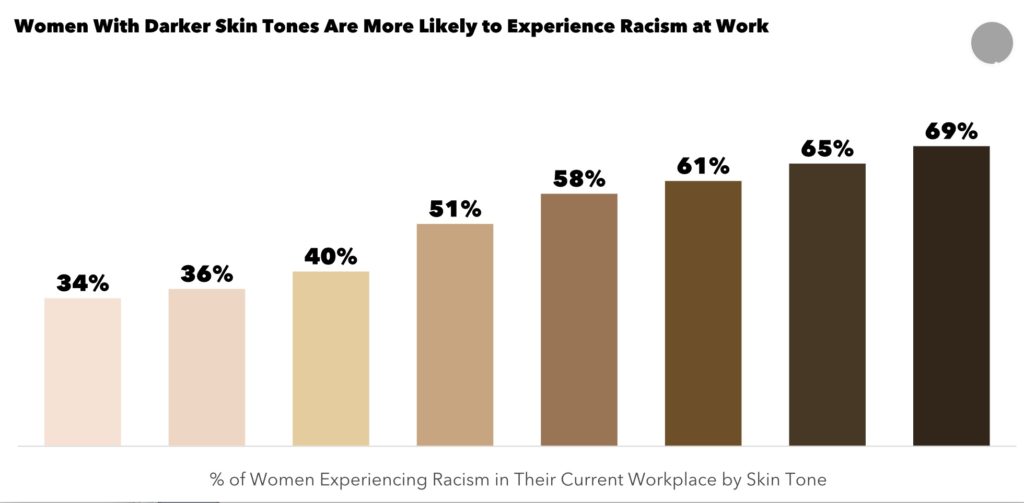Over half of women from marginalised racial and ethnic groups around the world experience racism at work – especially darker-skinned, queer, and transgender women, a new report has revealed.
Three years after many global CEOs pledged to fight racism following the 2020 murders of George Floyd, Breonna Taylor, and Ahmaud Arbery, half (51%) of women from marginalised racial and ethnic groups experience racism at work, confirmed the report carried out by Catalyst.
The report entitled Exposé of Women’s Workplace Experiences Challenges Antiracist Leaders to Step Up, of 2,734 women from marginalized racial and ethnic groups in the United States, the United Kingdom, Canada, Australia, and South Africa, found that women with darker skin tones, as well as queer (63%) and transgender (67%) women are particularly likely to experience racism at work, compared with cisgender heterosexual women (49%).
RIFE WORKPLACE DISCRIMINATION
A quarter (25%) also believe that senior leaders in their organisation would discriminate against an employee based on their ethnicity, race or culture. Survey respondents reported a wide range of overt and covert forms of racism, including negative assumptions, belittling insults, disparaging remarks, discriminatory actions, and outright racial slurs. The emotional weight of these episodes contributes to enduring racial trauma, a form of psychological injury. It also contributes to the “emotional tax” that many women from marginalised racial and ethnic groups pay in the workplace, whereby they are on guard to protect against bias and discrimination.
“These findings show that racism is an ongoing and pervasive part of the workplace experience for women from marginalised racial and ethnic groups,” said report author Kathrina Robotham, PhD. “This report demonstrates the compound disadvantage that women from marginalised racial and ethnic groups face when they belong to multiple marginalised groups. It goes beyond talking about women’s experiences as a monolith and highlights the effects of skin tone and hair texture, two aspects of identity that do not receive much attention, on women’s experiences of racism. It’s time to end the blatant racism that occurs around the globe for women from marginalised racial and ethnic groups and create accountability for nurturing antiracist workplaces.”

DIVERSE CULTURE
The data shows that an organisation’s “climate of silence”, for example, when employees do not feel safe or are discouraged from speaking up about work-related problems or concerns, is linked to an increased likelihood of experiencing racism at work. A climate of silence can allow sexist and racist behaviours to flourish. In fact, 67% of women from marginalised racial and ethnic groups who work in a climate of silence experience racism at work, compared to 46% of those who do not.
In contrast, employees working in diverse and inclusive climates – where individual differences are valued and people from marginalised groups are able to advance – are less likely to experience racism at work (61% versus 43%). Diverse and imclusive environments are also linked to increased job satisfaction and engagement and decreased employee withdrawal.
CEOS AND SENIOR LEADERS MUST COMBAT RACISM
Senior leaders play a critical role in whether or not racism occurs in their workplace. CEOs and senior leaders set the tone for organisational climate, and they can interrupt racism with allyship and curiosity. For example, when actively speaking out against racism, calling out biases, and inviting and listening to new perspectives. When senior leaders do not demonstrate allyship and curiosity, over half (56%) of respondents experience racism, compared to 46% when senior leaders do exhibit these behaviours. However, 49% say their senior leaders do not engage in allyship, and 43% say they do not exhibit curiosity.
“The days when organisations and CEOs could turn a blind eye to racism in the workplace are over,” shared Lorraine Hariton, President and CEO of Catalyst. “Senior leaders must cultivate open, diverse cultures where incidences of racism are swiftly dealt with and fairness and accountability are at the heart of an organisation’s processes and procedures.”
GUIDANCE FOR LEADERS
The report contains insightful guidance for senior leaders. This includes:
- Use allyship and curiosity to prevent experiences of racism. Educate yourself about the barriers that people from marginalised groups face in the workplace; cultivate empathy by listening; and speak up when you witness racism.
- Strengthen the organisational climate. Lift the silence that hides experiences of racism at work by speaking out. Demonstrate that you value diversity by critically evaluating your policies for fairness.
- Create accountability programmes. Develop feedback systems to measure and track experiences of racism. Hold employees who act counter to the organisation’s values accountable by taking swift action.
Click here to find out more.







































